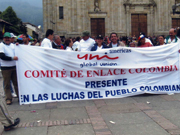News
Message to WEF: Put people, jobs at centre of recovery plans

The world economic crisis has reached disastrous proportions because social safety nets have been cut and the world’s working people are bearing the brunt of the recession and losing their jobs at an overwhelming pace, UNI Global Union said today.
Corporations, governments and NGOs will gather this week for the World Economic Forum (WEF) in Davos, Switzerland. The forum comes amidst announcements of huge job cuts at some of the world’s biggest multinationals.
“The financial casino generation have stripped away the social safety nets and now workers are in free fall,” said UNI General Secretary Philip Jennings. “Everyone should be pulling on the same rope to fundamentally change the system. We need a new kind of ‘ground-enomics,’ in other words we need to put people at the centre of economic recovery plans and build them from the ground up.”
Yesterday alone, companies announced plans to cut some 80,000 jobs worldwide— another staggering blow to working families.
So far government bailout plans have pumped money into financial institutions but have done little to stem the job losses. In fact, many companies, including some getting government money, have made cutting jobs the centrepiece of their recovery plans.
A prime example of this, Jennings said, is Citigroup, which got $45 billion in funds from the US government and is buying a brand-new $50 million jet for executives. The company, however, has refused to discuss with UNI and its member unions representing employees around the world its plan to cut 50,000 workers globally.
“The US government needs to hold Citigroup accountable for a decadent and wasteful ‘recovery plan’ that ensures extravagant comfort for executives but leaves the rest of its workers to fend for themselves,” said Jennings.
In October, the International Labour Organisation (ILO) warned the financial crisis would increase the number of unemployed by 20 million worldwide. The ILO estimates that, as a result of the crisis, the number of working poor living on less than $2 a day could increase by over 100 million.
UNI says that companies should not press the panic button for wholesale staff dismissal and called for attendees at the WEF to come up with a job-building strategy for their companies. Many jobs that are cut in response to the crisis may never come back, it warned.
“There’s a herd mentality in the stock market and there’s a herd mentality when it comes to jobs,” Jennings said. “Governments are idly standing by and watching unemployment mount as companies are putting workers on the chopping block first.”
Looking ahead, UNI believes the G20 meeting in April, which will bring together leaders from among the world’s biggest industrial and developing economies, must be a jobs summit that is dedicated to crafting a global employment strategy that creates sustainable well-paying employment with bargaining rights, instead of allowing workers to be treated as an expendable resource that can be cut to save money and cushion the blow for executives and investors.
UNI is the global union for skills and services with 20 million members in 900 unions.
For more information or to set up an interview with Philip Jennings at the World Economic Forum, contact UNI at +41 79 888 0753 or rachel.cohen@uniglobalunion.org.

